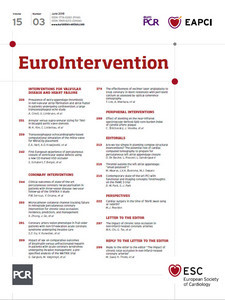We read with great interest the excellent article entitled “Prognostic impact of non-culprit chronic total occlusions in infarct-related cardiogenic shock: results of the randomised IABP-SHOCK II trial” by Saad et al1. The authors conducted a retrospective analysis to show that chronic total occlusion (CTO) in a non-infarct-related coronary artery (non-IRA) was an independent predictor of one-year mortality and 30-day ventricular arrhythmias in patients with cardiogenic shock (CS) complicating acute myocardial infarction (AMI). These findings complement previous findings that non-IRA CTOs were also arrhythmogenic, which translated into higher all-cause mortality2,3,4.
Our group recently conducted a systematic review and meta-analysis of published studies on the impact of CTOs on arrhythmic and mortality outcomes5. We found that the presence of IRA-CTOs was associated with higher risk of ventricular arrhythmia or appropriate implantable cardioverter-defibrillator therapy compared to non-IRA CTOs. However, the study population in the meta-analysis did not include patients with CS complicating AMI. The study by Saad et al illustrated that non-IRA CTOs carried a negative impact on prognosis in AMI patients with CS, identifying a highly vulnerable group of patients1. Studies conducted in Japan and Australia also reported higher rates of mortality in these AMI patient populations6,7. There are two main reasons that can explain these findings. Firstly, non-IRA CTOs reduce the supply that can be delivered to the region supplied by the IRA, increasing the risk of myocardial ischaemia to this region and beyond8. Secondly, these patients show more extensive adverse remodelling, which can compromise ventricular haemodynamics and increase the propensity to arrhythmogenesis. Successful percutaneous coronary intervention for CTOs has been associated with a lower risk of death, stroke, and coronary artery bypass grafting and less recurrent angina pectoris9. However, CTO revascularisation in the setting of CS is very difficult to perform and is likely to have a deleterious effect. In addition, the recent CULPRIT-SHOCK trial showed no benefit with immediate complete revascularisation compared with culprit lesion-only PCI in STEMI patients with CS10. Thus, treatment other than revascularisation, such as mechanical circulatory support or a wearable cardioverter defibrillator, may be even more aggressive in a patient with CS and a concomitant CTO in a non-IRA. Larger-scale prospective trials are needed to explore their benefits in this selected patient population.
Conflict of interest statement
The authors have no conflicts of interest to declare.

